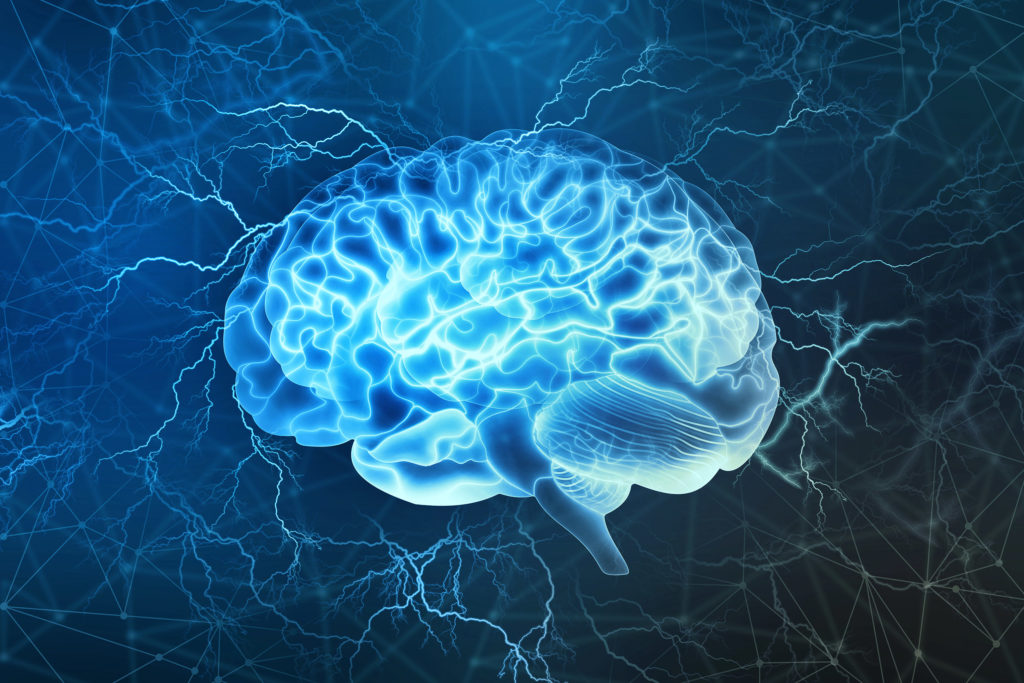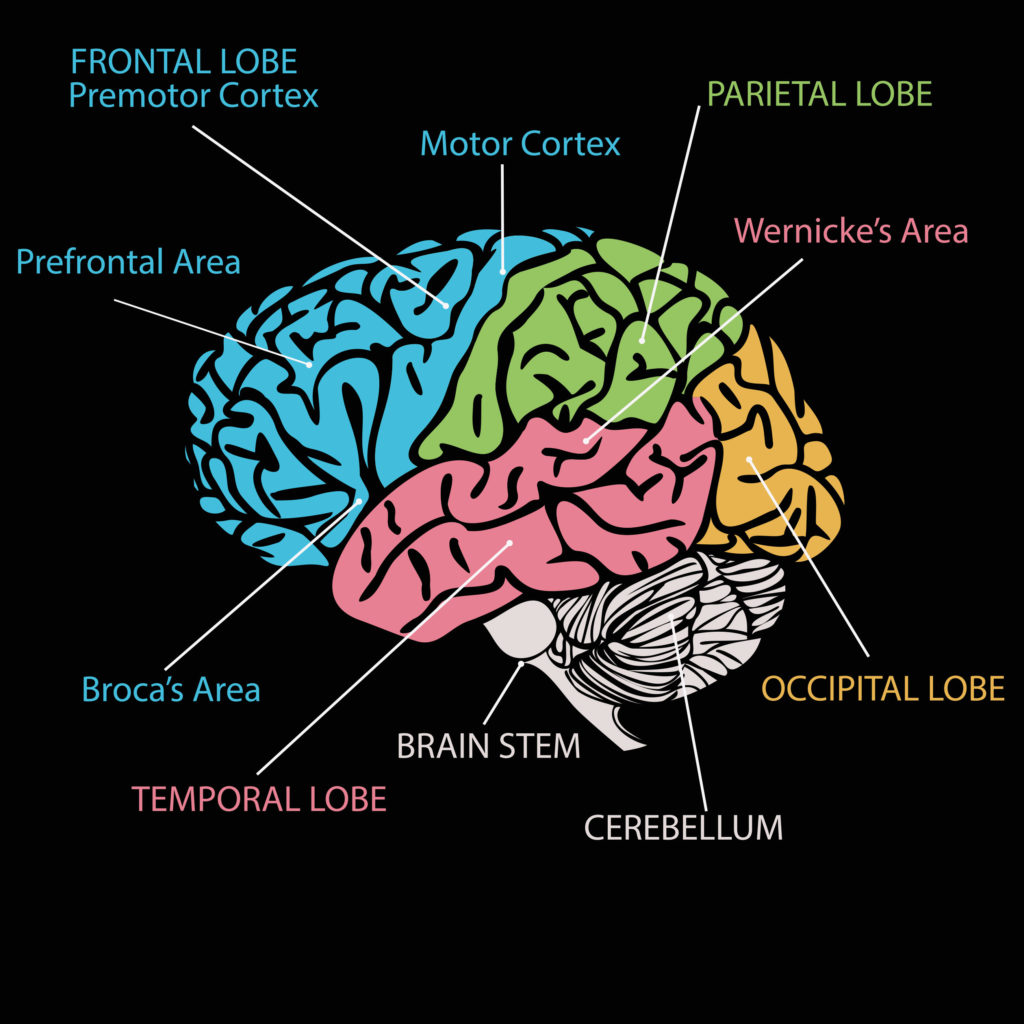The cognitive effects of cannabis can be subdivided into several parts. Acute cognitive effects are experienced immediately after use. Sometimes, there are also residual effects and even permanent cognitive effects from chronic use. Finally, there is also the chance of cognitive effects from abstinence. Let’s discuss them one by one.
Acute cognitive effects of cannabis
The acute cognitive effects of cannabis are numerous and vary widely from person to person depending on several factors including genetic makeup, age, gender, and individual tolerance and predisposition.
It is the phytocannabinoid THC that is the most prevalent psychoactive cannabinoid: It is the cannabinoid that is primarily responsible for the cognitive effects of cannabis. However, other non-psychoactive cannabinoids such as CBD, contribute synergistically to the cognitive effects of cannabis through the entourage effect. For example, CBD may work in synergy with THC to mediate its cognitive effects, depending on ratio and dose.
The best-known acute cognitive effects associated with cannabis are generally related to memory, learning, and problem-solving skills. In practical terms, this can mean that while under the influence of cannabis, an individual’s ability to plan, make decisions, maintain attention, solve problems, retain information, and cope with unexpected situations may be impacted. As will be discussed in this article, these impacts may be for the better or for the worse.

Research into the acute cognitive effects of cannabis
An important review of the existing literature published in 2012 notes that researchers first began investigating the acute cognitive effects (those experienced from 0-6 hours after consumption) of cannabis use in the 1970s. There is consistent evidence of alterations to learning and memory function. However, less attention has been given to the cannabis’ effects on higher executive function.
The effect of cannabis on attention is controversial, and appears to depend greatly on individual tolerance. A 2001 study found that neither high or low doses of THC impaired response to attentional tasks compared to placebo in chronic cannabis users. In the same study, high doses of THC actually significantly improved performance on a visual tracking task. Conversely, a 2009 study found that THC can induce transient, acute deficits in working memory and executive function.
The acute effect of cannabis on decision-making and risk-taking is also somewhat controversial, and appears to depend on dose. A 2005 study compared the effect of either high or low doses of THC compared to placebo on risk-taking and decision making. Researchers found that subjects exposed to high doses exhibited significantly greater risk-taking compared to the low-dose or placebo groups.
In contrast, a 2006 study concluded that the effect of THC on risk-taking was negligible, although it did impair executive function and motor control. THC also increased the rate of incorrect responses in the tests taken by subjects.
The acute impact of cannabis on memory function is also somewhat controversial. Multiple scientific studies have confirmed the impairment of short-term working memory function after THC ingestion. The effect of cannabis on episodic memory, on the other hand, is impaired according to science but enhanced according to anecdotal evidence.
As early as 1977, researchers were exploring the effect of cannabis on memory. In this study, the authors concluded that overall ability to recall information was reduced in subjects exposed to cannabis, and that visual recall was inferior to verbal. More recently, the aforementioned 2001 study demonstrated that memory was impaired in a dose-dependent manner in subjects exposed to THC.

There is some evidence to suggest that CBD may actually counteract the effects of THC when it comes to memory function. In this study, researchers found that THC and CBD had opposite effects in the brain regions responsible for verbal recall. This might explain why CBD is commonly used as an “antidote” to the psychoactive effects of THC.
Furthermore, anecdotal evidence suggests that THC enhances episodic memory, whereas scientific research completely contradicts this. The most popular anecdote on this topic comes from Carl Sagan in his article, Mr X, where he describes in extreme detail his experience of episodic memory under the effects of cannabis. At the same time, science suggests a deficit in episodic memory as a result of cannabis.
Over the years, a lot of research has gone into assessing the short-term effects of cannabis on human beings. While some things are generally accepted as true, there has been a tremendous amount of inconsistency between studies.
An academic systemic literature review including 165 studies up to 2007 confirms the inconsistencies with studies. The researcher, Lineke Zuurman, states that the most reliable biomarkers for cannabis intoxication were heart rate and “subjective effects”. This is an indication of just how vast the study of cannabis intoxication is, and that at this stage, subjective experiences provide just as much value as scientific and statistical data.
Residual & permanent cognitive effects of chronic cannabis use
Beyond intoxication, there exists the possibility of residual and permanent cognitive effects. As might be expected, long-term users of cannabis may be at a somewhat elevated risk of certain cognitive impairments that persist even after cessation of intoxication.
These impairments may be residual, occurring not long after cessation of intoxication, and related to lingering traces of the active compound in the system. They may also be permanent, persisting after all traces of the substance have left the system. Existing research has thus far yielded inconsistent and occasionally contradictory results.
A 2002 US study found that long-term users of cannabis demonstrated significant impairment in memory and learning tasks compared with short-term users or non-users. Conversely, a more recent study (published in 2011) found that although baseline results indicated significant differences between cannabis-using and non-using groups, when these results were controlled for gender and educational level, these differences all but disappeared.
After adjustment, it was found that former heavy users of cannabis performed better on one of four cognitive tests, specifically one related to verbal learning than current heavy users. This suggests that some degree of cognitive impairment exists in heavy, long-term users, but also that such impairments improved in former users.
Clearly, the extent of cannabis use plays a role in the potential development of long-term cognitive impairment. A 2006 study concluded that although cognitive effects may occur in heavy long-term users, moderate users displayed no deficits in memory or learning. The same subjects did, however, exhibit altered activity in the left superior parietal cortex of the brain during working memory processing.
Preliminary evidence from a pilot study conducted by Harvard PhD, Staci Gruber, even points towards cannabis improving certain aspects of cognitive function over time. It is one of the first studies of its kind, testing subjects before medical marijuana use and then again after the 3-month treatment.
Researchers found improvements on measures of executive function such as the Stroop Colour Word Test and Trail Making Test. The improvements were mostly reflected as an increased response time to tasks without making any more errors. This research is still in preliminary stages, and does not provide conclusive evidence on the topic.
Effect of abstinence on cognition in chronic users
As previously mentioned, the 2001 study showed that chronic cannabis users performed worse on attention tasks when abstinent compared to performance after ingestion of THC. This phenomenon has been observed repeatedly: a 2004 study compared heavy, chronic cannabis users with non-cannabis using controls, and found that abstinent users exhibited significantly slower information-processing speed, which normalized after smoking cannabis again.

One study found that abstinent cannabis users exhibited decreased activity in the prefrontal lobe (© Laura B. Dahl)
The study authors observe that this may imply that former cannabis users are at risk of resuming cannabis use in an attempt to regain optimal information-processing abilities or cognitive performance all together. There have been several other studies indicating that abstinent regular users continue to experience cognitive impairments for some time subsequent to cessation of use, but it does appear that abstinent chronic users may expect to regain optimal cognitive function with time.
Cognitive effects in former cannabis users
A 2002 systematic review of the existing literature concludes that there is no consistent evidence for persisting neuropsychological deficits in cannabis users. At least half the studies reviewed included some subtle impairments, but overall, the review concludes that no firm conclusion has been reached.
As a 2003 review of the scientific literature observes: “Our results indicate that there might be decrements in the ability to learn and remember new information in chronic users, whereas other cognitive abilities are unaffected. However, from a neurocognitive standpoint, the small magnitude of these effect suggests that if cannabis compounds are found to have therapeutic value, they may have an acceptable margin of safety under the more limited conditions of exposure that would likely obtain in a medical setting.”
A more recent study found that heavy cannabis users that had been abstinent for 25 days exhibited persistent decision-making deficits compared to non-cannabis using controls, as well as demonstrating altered brain activity. Abstinent users (moderate and heavy) showed increased activity in the left cerebellum and decreased activity in the right lateral orbitofrontal cortex and right dorsolateral prefrontal cortex.
This effect was also shown to be dose-dependent, as it was more pronounced in the ‘heavy use’ group compared to the ‘moderate use’ group when results were further subdivided. Furthermore, the moderate group differed only slightly from the control group, leading the authors to speculate that persistent decision-making deficits in very heavy users are dependent on a threshold-dose effect. Thus, it appears that further research is needed to ascertain the precise nature of the effect.
Cannabis, cognition and mental illness
The potential effects of cannabis use for individuals susceptible to or already suffering from mental illnesses such as schizophrenia is a vast area of research that is impossible to comprehensively summarize without overlooking a huge amount of detail. However, the mainstream media often disregards subtleties and methodologic flaws in studies and supplies incomplete information to the general public.
For the last few years, much has been made of the apparent link between cannabis use and onset of psychosis (an abnormal mental state that has different causes, such as to schizophrenia, bipolar disorder, or various other psychiatric conditions—or can resolve without causing long-term problems).
The link between cannabis and psychiatric conditions such as schizophrenia has been touched on by science, and one of the most corroborated results is that those with schizophrenia are more likely to use cannabis than the general public. However, it’s possible that cannabis use eases symptoms rather than worsen them.

A 2010 meta-analysis of the existing research found that schizophrenics that used cannabis actually exhibited superior neuropsychological functioning compared to non-cannabis using schizophrenics. They demonstrated only selective impairments while non-users demonstrated impairments across the board.
Cannabis users performed better on working memory, visual memory and executive function. Furthermore, individuals who began using cannabis earlier in life had less neuropsychological impairment than those that began use later in life. These findings suggest that, rather than triggering the disease, cannabis use in prodromal schizophrenics (i.e. individuals in the very early stages of schizophrenia) may confer a neuroprotective effect.
Cannabis & cognition in adolescents
Although it appears that cannabis use early in life is not responsible for the onset of psychosis or schizophrenia, there remains widespread concern that adolescents who use cannabis are subjecting themselves to various cognitive and psychological risks. Indeed, a 2014 review of the literature observed that “evidence is building to suggest that regular cannabis use during the teenage or emerging adult years (typically ages 15–25 years) is associated with cognitive deficits”.
The vast majority of the studies reviewed reported cannabis-related cognitive deficits including impaired processing speed, verbal memory, executive function and complex attention, along with an increased propensity for risky behaviour.
Studies investigating the effect of abstinence on adolescent users found that impaired processing speed, verbal memory, sustained attention and sequencing ability persisted at one month’s abstinence, but markedly improved at four months. However, this particular review made no mention of the methodology used to find and categorize the studies it analysed.

It is important to note that many of the existing studies into the cognitive effects of cannabis are methodologically weak, and the existence of apparently-conflicting results may in many cases be due to a lack of differentiation on the basis of age, gender or other confounding factors.
In the future, as better designed studies and analyses are published, we will be able to ascertain with far greater confidence the likely effects of cannabis on cognitive response, and how individual makeup can affect the severity and duration of cognitive impairment.
Furthermore, most of the existing research focuses solely on THC, but as our understanding of the synergistic effects of combining phytocannabinoids in specific ratios increases, we are likely to identify myriad cognitive effects. This includes CBD’s mediation of THC’s memory-impairing effects, which scientists have already begun exploring. There are many more complexities to explore, which hopefully will deepen our understanding of how cannabis affects cognitive function.
- Disclaimer:This article is not a substitute for professional medical advice, diagnosis, or treatment. Always consult with your doctor or other licensed medical professional. Do not delay seeking medical advice or disregard medical advice due to something you have read on this website.












cannabis kills the brain. Hence, It has negative impact cognitive performance.
Hi Mundia,
Please back up this comment with sources, as otherwise it is just your opinion – which you are entitled to, but it is contrary to all scientific evidence.
With best wishes,
Scarlet
Lester Grinspoon, one of the world leading experts on marijuana, Marincolo develops groundbreaking new hypothesis and explanations of how cannabis effects higher cognitive functions. Is it true that a marijuana high can lead to profound insights, as many users have reported?
Thanks for the article, as a fairly intelligent bipolar long time smoke it’s always been a bit of a question forced onto by society that why aren’t I as “stoned” as everyone else who smokes a bit of cannabis. I always contributed my tolerance to my genes, my great grandfather being a physician & merchant that sold and almost certainly used cannabis.
I know not much is understood about mental illness but it is generally agreed that bipolar is related to schizophrenia. It’s good to know that cannabis itself seems to help self regulate users. If only more research was put in and we could really understand this process and form better medicine that actually helps people.
Good overall read. Thank you.
I have been diagnosed with cerrabular ataxia whic is a degenerative brain disease and my doctor said my symptoms would get worse within the first year and it has been 4 years and change now I’m not a doctor and the usage of marijuana seems to help me out everyday
Interesting, I would live to know the sample size of these studies.
I am 53. I have been a cannabis user since age 14. I graduated high school in 2.5 years. I obtained my BS in 2013 with a GPA of 3.55 and I am currently working on my MFT with a GPA of 4.0.
I know many others like me, I think it would be interesting to study us.
I’m very curious on how cannabis affects our cognitive sense… For sure, I’ve seen a difference in myself, before smoking weed and currently.